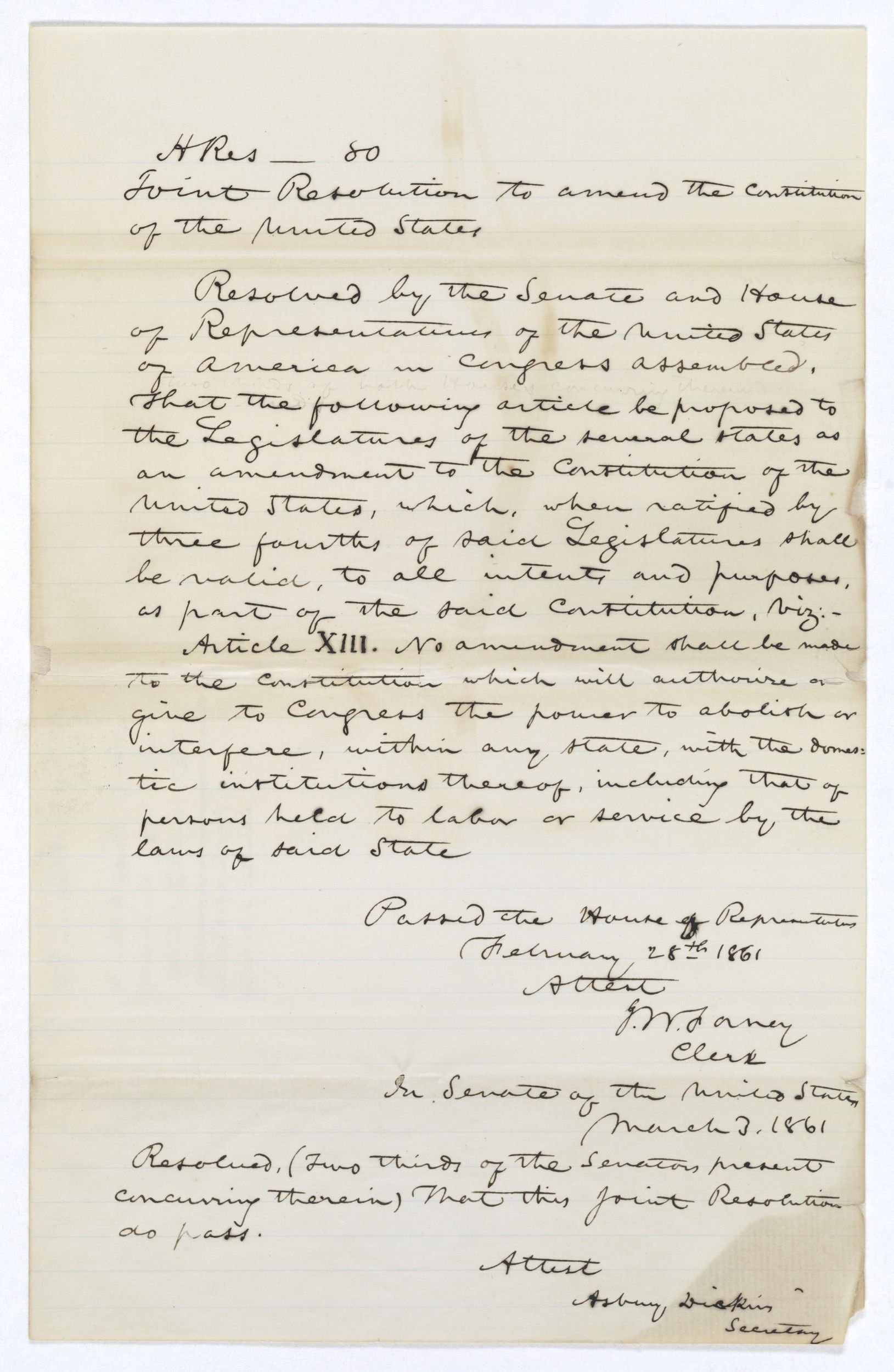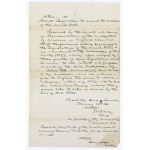House Joint Resolution Proposing an Amendment to Prohibit Congress from Abolishing Slavery
3/2/1861
Add to Favorites:
Add all page(s) of this document to activity:

Add only page 1 to activity:
Add only page 2 to activity:
H.J. Res. 80, the Corwin Amendment, proposed a constitutional amendment to prohibit Congress from abolishing slavery. As noted at the bottom of the amendment, the resolution passed by two-thirds in the House on February 28, 1861, and two-thirds in the Senate on March 3, 1861. A joint resolution is a formal opinion adopted by both houses of the legislative branch. A constitutional amendment must be passed as a joint resolution before it is sent to the states for ratification.
Weeks before the Civil War started, there was still hope of preserving peace and saving the Union. Representative Thomas Corwin (R-OH) introduced an amendment to sustain slavery and make the amendment itself unamendable. Congress approved it, but the Civil War started before the states could ratify. Four years later, the states ratified the 13th Amendment abolishing slavery—the opposite of Corwin’s proposal.
Weeks before the Civil War started, there was still hope of preserving peace and saving the Union. Representative Thomas Corwin (R-OH) introduced an amendment to sustain slavery and make the amendment itself unamendable. Congress approved it, but the Civil War started before the states could ratify. Four years later, the states ratified the 13th Amendment abolishing slavery—the opposite of Corwin’s proposal.
Transcript
H Res -- 80Joint Resolution to amend the Constitution of the United States
Resolved by the Senate and House of Representatives of the United States of America in Congress assembled. That the following article be proposed to the Legislatures of the several states as an amendment to the Constitution of the United States, which, when ratified by three fourths of said Legislatures shall be valid to all intent and purposes, as part of the said Constitution viz. -
Article XIII. No amendment shall be made to the Constitution which will authorize or give to Congress the power to abolish or interfere, within any state, with the domestic institutions thereof, including that of persons held to labor or service by the laws of said state.
Passed the House of Representatives
February 28th 1861
Attest
G.W. Faney
Clerk
In Senate of the United States
March 3, 1861
Resolved, (Two thirds of the Senators present concerning therein) that this Joint Resolution do pass.
Attest
Asbury Dickins
Secretary
Copy from Engrossed bill
36 Cong.} H. Res.—80
2 Sess.}
Joint Resolution to
amend the Constitution
of the United States
Passed HoReps 28 Feb 1861
Passed Senate 3 Mar 1861
This primary source comes from the Records of the U.S. Senate.
National Archives Identifier: 24824293
Full Citation: House Joint Resolution (H.J. Res.) 80 Proposing a Constitutional Amendment to Prohibit Congress from Abolishing Slavery; 3/2/1861; Bills and Resolutions Originating in the House of Representatives and Considered in the Senate during the 36th Congress; Bills and Resolutions Originating in the House and Considered in the Senate, 1789–2002; Records of the U.S. Senate, Record Group 46; National Archives Building, Washington, DC. [Online Version, https://docsteach.org/documents/document/amendment-prohibit-abolishing-slavery, April 25, 2024]Activities that use this document
- From Slavery to Juneteenth: Emancipation and Ending Enslavement
Created by the National Archives Education Team
Rights: Public Domain, Free of Known Copyright Restrictions. Learn more on our privacy and legal page.





